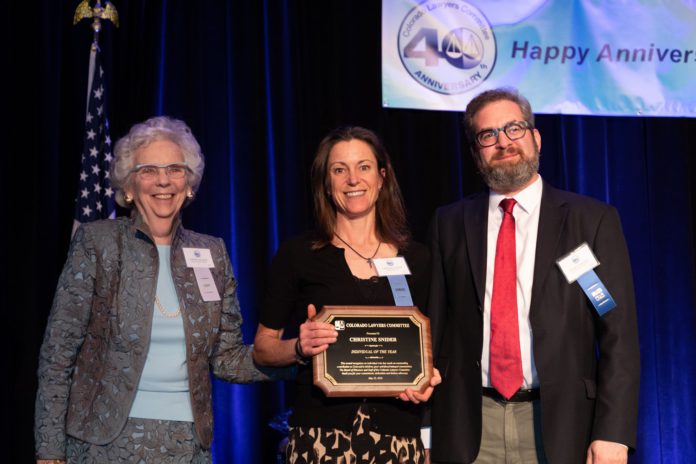

The Colorado Lawyers Committee held its 40th anniversary luncheon on Tuesday. The organization handed out its Law Firm of the Year and Individual of the Year awards to Husch Blackwell and paralegal Christine Snider of Ballard Spahr for their service to the Colorado Lawyers Committee.
Snider was recognized for her volunteer work with the Hate Crimes Education Task Force, which puts on an education program about Colorado’s hate crime laws to schools and community groups. Husch Blackwell received the Law Firm of the Year Award for its efforts volunteering at the CLC’s Denver Legal Night, which provides information and referrals to people who couldn’t otherwise afford legal services.
“We’re just among such great company here, and I just want to personally congratulate all the other nominees. Frankly, I didn’t think we stood a chance,” said Julie Sullivan, Husch Blackwell’s pro bono coordinator in Denver.
A portion of the luncheon was devoted to a keynote speech by Jeffrey Fisher, a co-director at Stanford Law School’s Supreme Court Litigation Clinic, about two Colorado cases in the national spotlight, Peña-Rodriguez v. Colorado and Masterpiece Cakeshop v. Colorado Civil Rights Commission.
Peña-Rodriguez concerns racial equality, while the Masterpiece Cakeshop case has pitted the First Amendment against LGBTQ rights. As a backdrop for understanding how the U.S. Supreme Court has approached each case, Fisher juxtaposed the progress made in the U.S. Supreme Court over the past few decades for each of those civil liberties. He offered thoughts about how LGBTQ rights have fared better in the courts than issues of racial equality, even though legal battles based on the latter go back much further in history.
“The 14th Amendment to the Constitution is most directly grounded in race, and so you’d think that those claims would be more successful in the Supreme Court than cases involving gay rights,” Fisher said.
He has argued dozens of cases in front of the Supreme Court, including Endrew F. v. Douglas County School District, which resulted in a wide-reaching interpretation of a student’s substantive educational right from an individualized education program under the Individuals with Disabilities Education Act.
In Shelby County v. Holder, decided in 2013, the Supreme Court struck down a section of the Voting Rights Act that requires states and localities with a history of racial discrimination in voting to obtain federal pre-clearance for any changes to their voting laws before their implementation.
Both Shelby County and LGBTQ rights cases contain a thread of equal dignity in the rulings, but the two types of cases have approached the topic differently. Fisher pointed to Justice Anthony Kennedy’s tendency to cite equal dignity for individuals in the decisions he has authored that have expanded rights for LGBTQ people. In the Shelby County case, the justices ruled in a 5-4 decision that subjecting some jurisdictions to pre-clearance and not others was unconstitutional.
“So you have this idea of dignity being used for individuals on the one hand, and for the states in the other,” he said. “Potentially perplexing when again, the 14th Amendment was really grounded in the notion that states had to fall into line when it came to respecting equal rights under the law.”
Both types of cases, Fisher said, have acknowledged changing societal circumstances can inform decisions about the laws that cases challenge.
“In the marriage equality cases, the court talked about how over the years, we have come to see how laws that seem natural or traditional really serve to simply oppress members of our community,” he said. In Lawrence v. Texas, Kennedy wrote the Constitution’s authors “knew times can blind us to certain truths, and later generations can see that laws once thought necessary and proper in fact serve only to oppress.”
In Shelby County, the justices employed the theme of shifting societal conditions by discussing that the racial progress made in the U.S. since the Voting Rights Act was enacted rendered the pre-clearance provision, though constitutional when passed, unnecessary.

Competing Rights in Colorado Cases
Both the Peña-Rodriguez and Masterpiece Cakeshop cases are studies in competing interests. Peña-Rodriguez related to a juror’s reliance on racial stereotypes in favor of convicting a criminal defendant. The Supreme Court held in such a situation, the Sixth Amendment requires that the rule prohibiting the use of juror testimony about deliberations to impeach a verdict has to give way in order to permit the trial court to consider the evidence of the juror’s statement and any Sixth Amendment violations as a result.
Fisher represented Miguel Angel Peña-Rodriguez in Peña-Rodriguez v. Colorado. In the case, he examined rule of evidence 606(b), which prohibits a juror’s testimony about things that occurred during the jury’s deliberations as part of an inquiry into the validity of a verdict or indictment. As it turns out, Fisher said, the rule is narrow and is just a rule of finality.
“Finality is important, we have all sorts of finality rules in our legal system that serve important values,” he said. “But maybe not quite as important as equal rights, and maybe not quite as important as being able to say we find it intolerable to have somebody convicted of a crime because of his race.”
Writing for the majority in Peña-Rodriguez, Kennedy said the type of racial discrimination at issue in the case is the very type of discrimination in the justice system the 14th Amendment aims to prevent.
The sanctity of racial equality even crept into the Masterpiece Cakeshop case. In an amicus brief to the Supreme Court arguing in favor of the bakery, Solicitor General Noel Francisco acknowledged the position that Phillips should not give up his First Amendment rights may be different in the context of racial equality.
In the Masterpiece Cakeshop case, David Mullins and Charlie Craig filed discrimination charges after Masterpiece Cakeshop owner Jack Phillips declined to create a custom wedding cake for the couple because same-sex marriage goes against his religious beliefs. Since 2012, an administrative law judge, the Colorado Civil Rights Commission and the Colorado Court of Appeals have each found Phillips’ refusal violated the Colorado Anti-Discrimination Act.
“You have the right of the couple to have the same access to publicly available goods and services as anybody else does and to have their dignity respected in the commercial marketplace,” Fisher said. “On the other hand, you have the very serious interest of a proprietor of a business who considers himself to be an artist, and considers his artistic skills to be part of his First Amendment rights.”
Fisher offered insights about the difference between the Masterpiece Cakeshop case and other LGBTQ rights cases. Previous cases such as those concerning marriage equality have not had components of possible infringement on other civil liberties, he said.
“So I think what [Masterpiece] Cakeshop tells us is that the fight for gay rights is now entering a new phase, and the truly difficult phase, of sorting out claims for equality in a world where there’s actually competing interests and sometimes competition for scarce resources.”
—Julia Cardi

